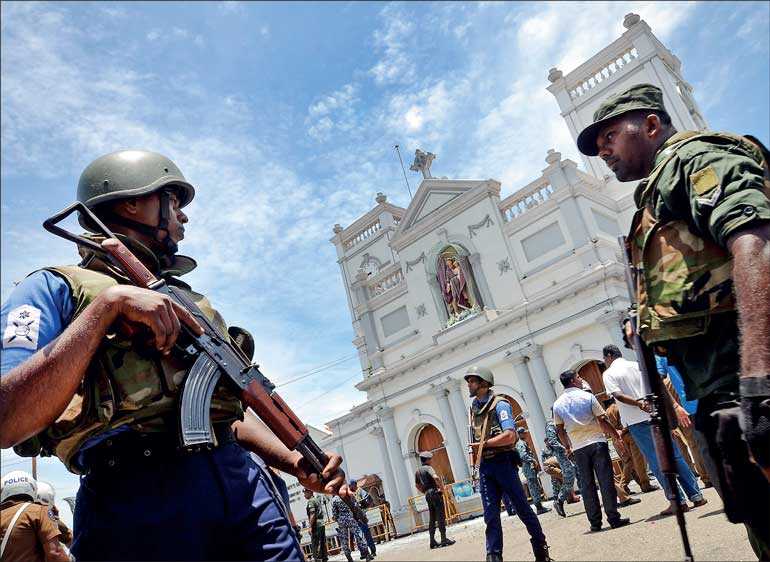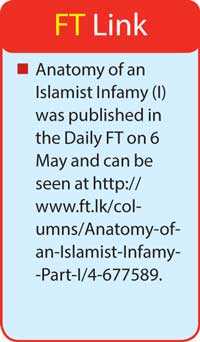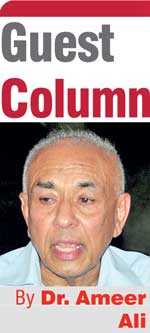Monday Feb 16, 2026
Monday Feb 16, 2026
Wednesday, 8 May 2019 00:00 - - {{hitsCtrl.values.hits}}

It takes two hands to clap and make a noise, and what a deadly noise did Sri Lankans hear during that fatal Easter Sunday? In the first part of this analysis, the Muslim leadership’s hand was identified and discussed. The second part looks at the hand of governments that governed this country since Independence, and how they laid the remainder of the bricks that paved the bloody road.
Politicisation of Buddhism
Long before Ashraff and his SLMC allowed Islamism creep into Muslim politics, Bandaranaike (SWRD) politicised Buddhism to win his electoral battle against the UNP. His landslide victory at the 1956 General Elections, to which  he harnessed the support of Buddhist monks, Ayurvedic physicians, and village school teachers, demonstrated the political potential of Buddhism in changing governments in Sri Lanka, which even led the American CIA to politicise Buddhism in South East Asia to fight against the rise of communism (Eugene Ford, “Cold War Monks”, 2017). While SWRD won the elections and lost his life at the hands of a Buddhist monk, the Americans harnessed Buddhism and lost the fight against communism in Vietnam and Cambodia.
he harnessed the support of Buddhist monks, Ayurvedic physicians, and village school teachers, demonstrated the political potential of Buddhism in changing governments in Sri Lanka, which even led the American CIA to politicise Buddhism in South East Asia to fight against the rise of communism (Eugene Ford, “Cold War Monks”, 2017). While SWRD won the elections and lost his life at the hands of a Buddhist monk, the Americans harnessed Buddhism and lost the fight against communism in Vietnam and Cambodia.
In Sri Lanka, although Buddhism continued to play its role in mobilising support to different political parties, because of the looming Sinhalese-Tamil ethno-nationalist confrontation from the mid-1950s, it was ethnicity rather than religion that dominated the political stage, although in the 1960s Buddhism once again joined the political campaign against Roman Catholicism, when the SLFP Government decided to nationalise all denominational educational institutions. Even today, there is one Buddhist monk in Parliament. What is there to stop more entering? The question is, is that the legitimate place for Buddhist monks? Only the Sangha can answer this question.
Politics of pragmatism
However, to all governments after independence, and for that matter, to the Sinhalese people as a whole, Muslims and Islam were never a problem. By aligning with the governments in power and in supporting the Sinhalese against Tamils, Muslim leaders until late 1980s showed an incredible talent in pragmatic politics, through which their community was rewarded handsomely. 
There was another reason why governments were particularly keen to keep Muslims on their side. This was the Muslim connection to the outside world. Theoretically, Sri Lankan Muslims are part of the universal Muslim Ummah, or community. Therefore, any anti-Muslim policy or open discrimination against that community would provoke adverse reaction from the Muslim world, whose economic assistance and support in the international fora were badly needed to an emerging Sri Lanka. When the civil war broke out in the 1980s, these considerations became paramount.
Politics of pragmatism enabled the Muslim community to live peacefully and thrive economically, socially, culturally, and educationally, from the day they set foot in the country. The 1915 Sinhalese-Muslim riots was an aberration, caused by an alien element that was soon forgotten by both communities. From the 1980s to 2009, all communities, including the Tamils, suffered from an unnecessary but expensive civil war. When the LTTE was defeated in 2009, and when a victorious President Rajapaksa declared that there would be no more Sinhalese, Tamils, or Muslims in the future, but only Sri Lankans, everyone who heard him felt a sigh of relief. Everyone thought that democracy, with its principles of equality, freedom, and justice had returned with vengeance. Alas! The nation was greatly disappointed when the same President allowed a vociferous minority of far-right Buddhists to overrule him, and declare that Sri Lanka is a Buddhist country, and that minorities are allowed to live here only at the behest of Buddhists. No Buddhist politician or leader challenged this assertion.
Rise of the far-right
Encouraged by the military victory against Tamils, the larger minority, far-right Buddhist elements now focused their attention on the smaller minority, Muslims. Thus, instead of popular democracy, the country entered into an era of ethno-religious majoritarian democracy.
Far-right politics is a twenty-first century phenomenon that arose out the failure of a much-touted neoliberal economic globalisation, and is now destabilising several Western democracies, including the USA. The open economy of Sri Lanka, which embraced the neoliberal philosophy since 1978, also began to feel the effects of that failure. Economic cleavages were widening, national debt was increasing, cost of living was rising, and corruption reigned supreme in government management. Without understanding or refusing to understand the unfolding of this major drama, the far-right, like in the West, began to scape-goat the Muslim minority for all the evils.
The growing Islamism, an emerging commercial rivalry, and a deliberately provoked fear among the Sinhalese of a looming Muslim population explosion, fuelled an anti-Muslim fire lit by the far-right elements. The issue of Islamism has already been dealt with in Part One. In an open economy that encourages free enterprise and competition, not everyone can succeed. Competition can be cruel as well as rewarding, depending on one’s innovative, hardworking and marketing ability, and talent. 
Historically, Sri Lankan Muslims were best known for their commercial and business acumen. They did well under the capitalist economy after independence, but suffered under the socialist regime of Srimavo’s leftist coalition, between 1970 and 1977. When Jayawardene enunciated the end of dirigisme and reintroduced capitalism, Muslims once again took advantage of it, and a few did extremely well. A couple of leading retail fashion establishments in the country for, example, are Muslim owned, and so are a few leading restaurants in Colombo and other big cities. These, in particular, became an eyesore to the far-right nationalists. Several Muslim businesses were burnt, looted, and ransacked under false pretences. Security for these businesses were pathetically lacking. There was and still is a vicious campaign unleashed by anti-Muslim groups to boycott Muslim shops and businesses. There is evidence that certain Sinhalese businesses were funding this anti-Muslim campaign. A government’s inaction or delayed action against these hoodlums naturally angered the business community. Justice delayed is justice denied.
Some smart but pseudo-experts in demography within the far-right deliberately twisted the census statistics, and presented a phantasmagorical picture about a looming Muslim population explosion, to make the Sinhalese a minority in Sri Lanka. Without any understanding of, or deliberately ignoring, factors that determine population growth in the short and long runs, these pseudo-experts showed that the 9% of Muslims in this country will soon become the majority, and create an Islamic state, because of Muslim women’s unusual fecundity. That the Government Department of Census and Statistics denied their conclusions did not discourage them. To strengthen their argument, they even claimed, without any concrete proof, that Muslim businessmen and restaurateurs were distributing contraceptives to Sinhalese female customers, to reduce the birth rate among them.
All this created an environment of Islamophobia that led to sporadic anti-Muslim riots. Aluthgama, Ampara, Gintota, and Digana were the prominent ones. That a few Buddhist monks participated in these riots while police was looking the other way is further evidence of the politicisation of Buddhism. These riots took place both under the Rajapaksa Presidency as well as the Sirisena Presidency. Both presidencies and governments under them failed to take stern action to bring the perpetrators to books. The main reason for this failure was the need to protect the Buddhist vote bank. If the first bloody brick towards the Easter infamy was laid by Wahhabists in Kattankudy, more were laid by the far-right in Aluthgama, Ampara, Gintota and Digana.
Vote bank
In the ethno-religious democracy of Sri Lanka, the primary objective of every politician and every political party is not to work for the prosperity of the country and its people or its economy, but to capture the ethnic or religiously divided vote bank to remain in or capture power. It is this political strategy of present and past regimes that has weakened the rule of law in Sri Lanka. Recent governments have all been coalitions. One important component in these coalitions had been the SLMC and its splinter ACMC. In such a coalition, if the government shows tolerance towards lawlessness of the supporters of one segment of the coalition, how can it deny the same tolerance towards the lawlessness of the supporters of another segment?
It was this dilemma and the powerlessness of Muslim coalition partners in the government to deliver justice to Muslim victims that made a militant section of Wahhabi activists to seek revenge. To put it bluntly, while the Sinhalese politicians were tolerating unruly far-right Buddhists and their anti-Muslim rampaging, Muslim politicians had no choice but to tolerate Wahhabi extremists, who were becoming militant in front of their eyes. Let us illustrate this point with two instances.
One of the monks closely associated with anti-Muslim violence is Galagoda Aththe Gnanasara. There is ample evidence to prove this monk’s un-Buddhist behaviour. He is no doubt in prison now, but not for his involvement in violence, but for contempt of court in relation to an unrelated case. However, how does one explain the attempt by some prominent Buddhists, including one Mahanayake, to get him released from prison through Presidential pardon on the eve of this year’s independent day celebrations? Although the move failed because of widespread protests, this episode demonstrates clearly the prevailing attitude within certain influential groups, which seem to believe that justice, law, and order must serve the interests of them more favourably than those of others.
The second instance is related to the Mawanella bigotry in December last year. This bigotry was a clear signal to the government that something far more sinister and serious was brewing within the Muslim community. Although the police took some action and made a few arrests, no one bothered to go to the bottom of that incident and dig out what motivated those bigots to do what they did. Was that a deliberate neglect? Had that been done, there would not have been a Bloody Easter. However, after that, there was one shooting incident in which the victim was a minister’s secretary. Police made an arrest, but according to that minister, the person arrested was released because of pressure from a powerful politician. Doesn’t this show that politicians and political groups are protecting even criminals among their supporters in order to safeguard their respective vote banks? This is the tragedy in Sri Lanka.
Sri Lanka does not need an Anti-terrorism Act to maintain law and order. All that it needs is to apply the existing law without fear or favour and allow the judiciary to act independently.
Government in paralysis
The situation deteriorated and became almost comical after October last year, when the President, acting on dubious advice, unconstitutionally dismissed the elected Prime Minister and prorogued Parliament. It took three months until the Judiciary put the Prime Minister back on his seat and restored his Government.
Since that restoration, and in light of the forthcoming Presidential election, which is to be preceded or followed by a General Election, the nation’s Government is in a state of paralysis. A President who wants to sabotage the Prime Minister and the Government, a Government surviving on life support from minority parties, and an Opposition which will not shy away from whipping up ethno-nationalism to capture Government, is a recipe for uncertainty and disharmony.
The paralysis deteriorated so badly that neither the President, nor the Prime Minister and not even the Opposition had any clue about the growing terror menace in their backyard. Not only was there an intelligence failure, but also a determined indifference towards information received from local as well as foreign sources.
Why was this indifference? Or was it also a deliberate neglect? The Easter Sunday infamy was the product of this paralysis and negligence. What should be done now and how to move forward? That will be answered in the concluding part of this analysis.
